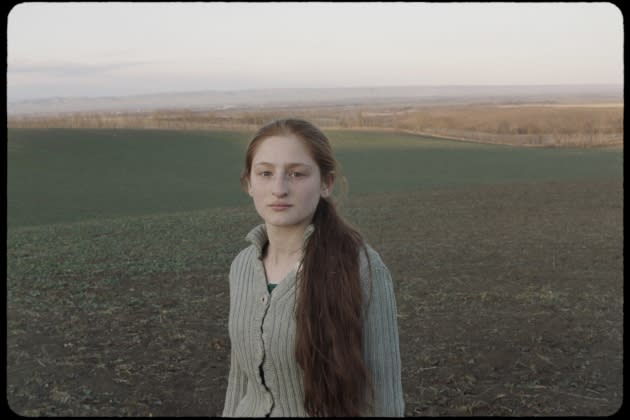Malika Musaeva Makes History at Berlin With Chechen Film ‘The Cage Is Looking for a Bird’
- Oops!Something went wrong.Please try again later.

First-time writer-director Malika Musaeva is set to make history at this year’s Berlin International Film Festival, where her female-centered coming-of-age drama “The Cage is Looking for a Bird” is the first Chechen-language film ever selected by the venerable German fest.
Musaeva’s debut, which world premieres Feb. 22 in the festival’s competitive Encounters section, focuses on a group of Chechen women living in a remote rural village, where they must defend their freedom and the right to live their own lives.
More from Variety
German Series Projects Impress With Timely Subject Matter: Murder, Intrigue, Scandal, Mystery
Beta Film's Crime Drama Series 'The Silence' Heads to Ukraine for Season 2 (EXCLUSIVE)
At the film’s heart is a friendship between two teenage girls, played by first-time actors Khadizha Bataeva and Madina Akkieva. On the precipice of adulthood, the duo seeks refuge in each other as they navigate difficult decisions about their futures.
“The Cage is Looking for a Bird” is produced by Hype Studios, the recently launched outfit of producer Ilya Stewart, whose upcoming slate includes new features from Kirill Serebrennikov (“Tchaikovsky’s Wife”), Malgorzata Szumowska (“Infinite Storm”) and Egor Abramenko (“Sputnik”). Pic was made with the support of Russian filmmaker Alexander Sokurov’s film fund and is being repped internationally by Totem Films.
Born in Grozny, the capital of Russia’s Chechen Republic, Musaeva says she conceived of the film as a “collection of different experiences, different facts, different destinies,” inspired by the personal histories of family members and friends and the many women who surrounded her throughout her life.
The director and her family left Chechnya in 1999, during the brutal Russian campaign to quell a separatist movement in the Muslim-majority republic, and spent the bulk of her childhood on the move: in the Russian republic of Ingushetia, then Ukraine, then Germany, before she returned to Russia. There she would go on to pursue a degree in film and study in the influential directing workshop established by Sokurov, the celebrated Russian director of Venice Golden Lion winner “Faust,” whose graduates include Cannes prize-winning directors Kantemir Balagov (“Beanpole”) and Kira Kovalenko (“Unclenching the Fists”).
Musaeva then returned to Germany to continue her studies, enrolling in a master’s program in Hamburg and, after graduating, writing a script about the experiences of Chechen refugees in Europe. But German broadcasters and funding bodies weren’t receptive to what one described as a “kitchen drama” focused on the interior lives of people living on the fringes of German society. “We were asked why Germans should watch a movie about Chechen refugees,” Musaeva says. The script was shelved.
Those rejections, however, marked a turning point for the young director, who was approached by her mentor Sokurov about making a first feature — and to do it, no less, in her homeland of Chechnya. Musaeva didn’t hesitate to accept the offer.
Returning to Chechnya to shoot a movie, however, presented its own challenges. Arriving in one village in an unfamiliar car with St. Petersburg license plates, she instantly aroused suspicions; in another, the villagers were more welcoming — but none had ever appeared on camera before.
“I was desperate,” Musaeva admits. But having once lived in a neighboring village, she found common ground with the locals and soon befriended Bataeva, who introduced Musaeva to her friends and family. All would soon play parts in the film, effectively playing versions of themselves on screen. “It was important for me not to lose this connection,” says the director. “They were very natural. They didn’t act. They lived their life, and the only thing I needed to do was [direct].”
A turbulent year since Russia’s full-scale invasion of Ukraine has stirred painful memories for Musaeva. “As someone who was born during a war, I understand it like few others do,” she says. “I am strongly against the war on Ukraine and will never comprehend how anything could be more important than human life.”
Watching news footage of Russian warplanes flying over Ukraine last year, the director says she experienced flashbacks of her own war-torn childhood. “That sound, you live with it forever. I think many Chechen people, they live this trauma again.”
Though Chechnya is still nominally a Russian republic, Musaeva insists: “I’ve never felt Russian. I’ve always felt Chechen.” Yet she is, by her own admission, caught in the cross-currents of her complicated past. “I’ve felt all my life that I’m not normal. That I’m just different,” she says. “When I lived in Russia, I was treated like a terrorist…. In Germany, I’m an immigrant. And coming back to Chechnya, I’m also different. I’m not like regular Chechen people.”
She is, nevertheless, fiercely proud of her Chechen identity and her historic achievement in Berlin. No less important, she adds, is the inspiration she wants to give other Chechen women and girls who, like her, want to pursue their own destinies. “Maybe it will give them some hope, and it will show that there are other possibilities — there are ways to do something they always dreamed of,” she says.
Best of Variety
Sign up for Variety’s Newsletter. For the latest news, follow us on Facebook, Twitter, and Instagram.
